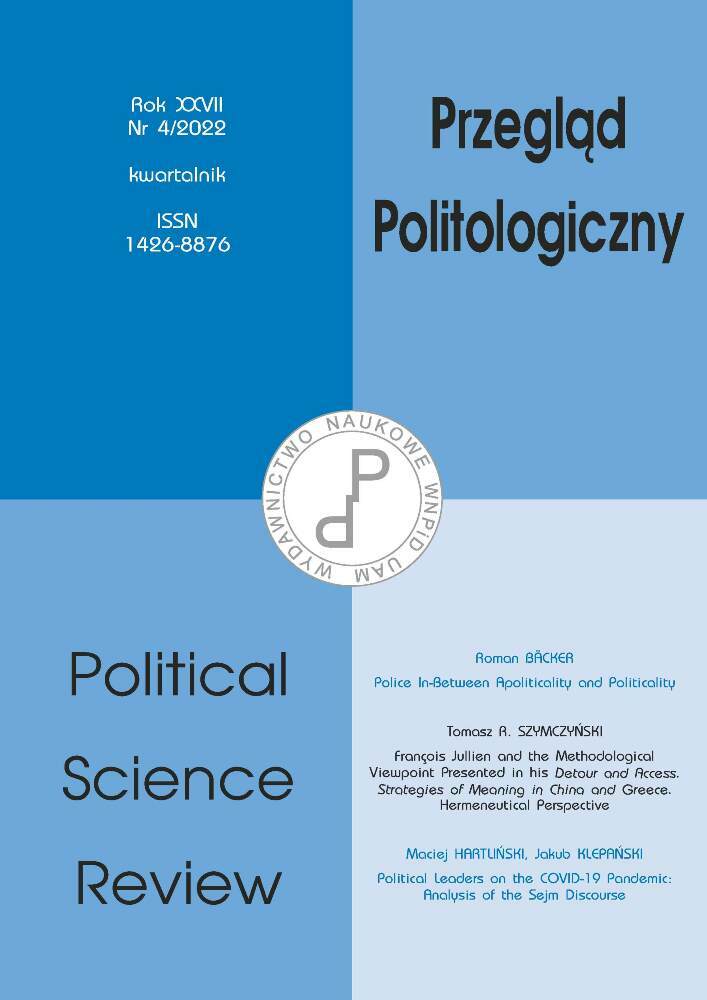Abstrakt
Celem tekstu jest skonstruowanie narzędzia teoretycznego pozwalającego na tak precyzyjne, jak tylko to możliwe usytuowanie relacji w danym państwie pomiędzy policją a elitą rządzącą. Relacje pomiędzy policją a elitą rządzącą mieszczą się pomiędzy typem idealnym apolityczności a typem idealnym polityczności. Pięć etapów relacji elit rządzących z biurokracją na continuum pomiędzy typem idealnym apolitycznej Weberowskiej biurokracji a antynomicznym mu typem idealnym upolitycznionym systemem patronażu można uszeregować następująco: samoregulacji, niezależności personalnej, niepewności, lojalności i wzmocnionej lojalności. Test empirycznej przydatności schematu powyższych pięciu etapów polegający na analizie przypadku jednego państwa charakteryzującego się dużą rozpiętością ewolucji reżimów autokratycznego i demokratycznego (a więc powojennej Polski) wypadł pozytywnie. Relacje między policją, a dokładniej: Milicją Obywatelską, w okresie PRL-u można zdefiniować jako znajdujące się na etapie wzmocnionej, bardziej precyzyjnie: podwójnej, lojalności. W okresie III RP relacje pomiędzy policją a elitami rządzącymi można usytuować na etapie czwartym – lojalności. Nieliczne próby zmiany tego typu relacji i przejścia na etap samoregulacji lub niezależności personalnej pozostawały na poziomie w najlepszym przypadku nieskutecznych i tymczasowych prób.
Finansowanie
This research paper is a result of the research project Civil Disorder in Pandemic-ridden European Union. It was financially supported by the National Science Centre, Poland [grant number 2021/43/B/HS5/00290].
Bibliografia
Bäcker R. (2011), Nietradycyjna teoria polityki, Toruń.
Bäcker R. (2019), Methodology of Political Science. The case of eurasianism, „Przegląd Politologiczny”, no. 3. DOI: https://doi.org/10.14746/pp.2019.24.3.6
Baddeley S., James K. (1987), From political neutrality to political wisdom, “Politics”, vol. 7, no. 2. DOI: https://doi.org/10.1111/j.1467-9256.1987.tb00262.x
Beetham D. (2018), Max Weber and the theory of modern politics, John Wiley & Sons.
Bloch M. (1981), Społeczeństwo feudalne, PWN, Warszawa.
Bozeman B., Sarewitz D. (2005), Public values and public failure in US science policy, “Science and Public Policy”, vol. 32, no. 2. DOI: https://doi.org/10.3152/147154305781779588
Bruun H. H. (2001), Weber on Rickert: From value relation to ideal type, “Max Weber Studies”.
Burnetko K. (2003), Służba cywilna w III RP: punkty krytyczne, https://www.batory.org.pl/ftp/program/przeciw-korupcji/publikacje/sluzba_cywilna.pdf, 07.08.2022.
Chubin D. E., Hackett E. J. (1990), Peerless science: Peer review and US science policy, Suny Press. DOI: https://doi.org/10.1063/1.2810292
Czop A., Sokołowski M. (2013), Historia polskich formacji policyjnych od II wojny światowej do czasów współczesnych, „Kultura Bezpieczeństwa. Nauka – Praktyka – Refleksje”, no. 13.
Fraenkel E. (1943, last edition 2018), The dual state: a contribution to the theory of dictatorship, Oxford University Press.
Gadowska K. (2009), Działania pozorne: problem upolitycznienia procesu obsady wyższych stanowisk w służbie cywilnej w Polsce, „Przegląd Socjologiczny”, vol. 58, no. 1.
Kacprzak I. (2020), W służbie cywilnej rządzi klucz partyjny. Ministerstwa i Kancelaria Premiera nie ogłaszają konkursów na wysokie stanowiska, 16.09.2020, „Rzeczpospolita”, https://www.rp.pl/polityka/art525571-w-sluzbie-cywilnej-rzadzi-klucz-partyjny, 07.08.2022.
Karłowicz Z. (b.d.), „Solidarność” – Milicja Obywatelska, https://teatrnn.pl/leksykon/artykuly/solidarnosc-milicja-obywatelska-mo/, 08.08.2022.
Kłoskowska A. (1998), Biurokracja, in: Encyklopedia socjologii, T. I, Oficyna Naukowa, Warszawa.
Lichwa A. (2017), Wybrane zagadnienia dotyczące działalności Milicji Obywatelskiej na Dolnym Śląsku w latach 1945–1949, „Folia Iuridica Universitatis Wratislaviensis”, vol. 6, no. 2.
Majchrzak G. (b.d.), Związek Zawodowy Funkcjonariuszy MO, in: Encyklopedia Solidarności, https://encysol.pl/es/encyklopedia/hasla-rzeczowe/14856,Zwiazek-Zawodowy-Funkcjonariuszy-Milicji-Obywatelskiej.html, 08.08.2022.
Majchrzyk K. (2020), Funkcjonowanie Wydziału Administracyjnego KW PZPR w Lublinie w latach 1957–1975 ze szczególnym uwzględnieniem nadzoru nad wymiarem sprawiedliwości, „Wschodni Rocznik Humanistyczny”, vol. 17, no. 1.
Majer P. (2021), Próba powołania Związku Zawodowego Funkcjonariuszy Milicji Obywatelskiej w 1981 roku i współczesne spory związane z tą inicjatywą, „Echa Przeszłości”, vol. XXII, no. 1. DOI: https://doi.org/10.31648/ep.6718
Mayntz R., Derlien H.-U. (1989), Party patronage and politicization of the West German administrative elite 1970–1987: toward hybridization?, “Governance”, vol. 2, no. 4. DOI: https://doi.org/10.1111/j.1468-0491.1989.tb00099.x
McCulloch A. D. (2016), Charisma and Patronage: Reasoning with Max Weber, Routledge. DOI: https://doi.org/10.4324/9781315571324
Misiuk A. (2018), Policja Polska w świetle wypowiedzi komendantów głównych Policji w latach 1990–2018, „Securitologia”, no. 1.
Otrębski M. (2008), Apolityczność policji. Nakaz prawny czy zobowiązanie moralne władzy państwowej?, „Bezpieczeństwo. Teoria i Praktyka”, special issue.
Rak J. (2021a), Framing enemies by the state television: delegitimization of anti-government protest participants during the first wave of the pandemic in Poland, “Journal of Contemporary Central and Eastern Europe”, vol. 29, no. 2–3. DOI: https://doi.org/10.1080/25739638.2021.2007601
Rak J. (2021b), Policing anti-government protests during the coronavirus crisis in Poland: Between escalated force and negotiated management, “Teorija in Praksa”, no. 58. DOI: https://doi.org/10.51936/tip.58.specialissue.598-615
Rak J., Bäcker R. (2022), Victories and defeats of quasi-militant democracies in post-communist Europe, in: Neo-militant Democracies in Post-communist Member States of the European Union, Routledge. DOI: https://doi.org/10.4324/9781003245162
Rex J. (1977), Value-relevance, scientific laws, and ideal types: The sociological methodology of Max Weber, “Canadian Journal of Sociology/Cahiers canadiens de sociologie”. DOI: https://doi.org/10.2307/3340569
Solarz P. (2013), Biurokracja w funkcjonowaniu aparatu państwowego w Polsce po 1989 roku, Vizja Press & IT.
Sprengel B. (2019), Generałowie Policji, WN UMK, Toruń.
Szczepaniak I. (2022), Policja a protesty Strajku Kobiet–perspektywa kryminologiczno-socjologiczna: Police vs. protests of Women’s Movement in Poland – criminological and sociological perspective, “Archiwum Kryminologii”, ahead-of-print.
Triantafillou P. (2015), The politics of neutrality and the changing role of expertise in public administration, “Administrative Theory & Praxis”, vol. 37, no. 3. DOI: https://doi.org/10.1080/10841806.2015.1053362
Udy Jr. S. H. (1959), Bureaucracy and Rationality in Weber’s Organization Theory: An Empirical Study, “American Sociological Review”. DOI: https://doi.org/10.2307/2088566
Weber M. (1991), Essays in sociology, in: eds. H. Gerth, W. Mills, Psychology Press.
Weber M. (2002), Gospodarka i społeczeństwo, Warszawa.
Wójcik P. (2020), Nastał urzędniczy fast food. Jak PiS osłabia niezależność służby cywilnej, 29.11.2020, „Gazeta Prawna”, https://serwisy.gazetaprawna.pl/praca-i-kariera/artykuly/1497480,sluzba-cywilna-urzednik-mianowany-administracja-publiczna-niezaleznosc.html, 07.08.2022.
Licencja
Prawa autorskie (c) 2022 Roman Bäcker

Utwór dostępny jest na licencji Creative Commons Uznanie autorstwa 4.0 Międzynarodowe.

